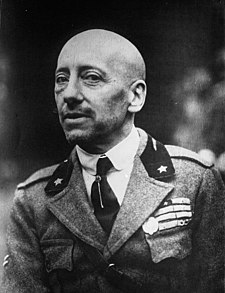Orestes Cotta
This article is incomplete because it is pending further input from participants, or it is a work-in-progress by one author. Please comment on this article's talk page to share your input, comments and questions. Note: To contribute to this article, you may need to seek help from the author(s) of this page. |
Orestes Cotta | |
|---|---|
 | |
| Leader of the Jumentes | |
| In office 22 November 1930 – 22 January 1947 | |
| Deputy | Thomas Bertinianus Alphius Cotta |
| Preceded by | Position created |
| Succeeded by | Flavius Luonercus |
| Senator of Latium | |
| In office 3 January 1935 – 6 January 1935 | |
| Personal details | |
| Born | Orestes Cotta Scaurus 19 April 1889 Tarqunii, Latium |
| Died | 22 January 1947 (aged 49) Ascanium, Latium |
| Cause of death | Suicide by gunshot |
| Nationality | Latin |
| Political party | Jumentes |
| Spouse | Sophia Aurelia (m. 1921–1950) |
| Domestic partner | Euphemia Florentia (1942–1947) |
| Children | 7 |
| Military service | |
| Allegiance | Latin Empire Latin Social Republic |
| Branch/service | |
| Years of service | 1915–1917 |
| Rank | Peditatus |
| Battles/wars | |
Orestes Cotta (Orestes Cotta Scaurus; 19 April 1897 – 22 January 1947) was a Latin revolutionary who was the leader Jumentes and VMNO from 1933 until his death on 1947. Cotta rose to prominence through his writings, political activities, and revolutionary activities. He briefly earned a seat in the Senate and was soon after expelled. Under his leadership, the VMNO orchestrated the Ascanium Massacre and initiated the Social War, during which he was actively involved in military operations throughout the war. Cotta styled himself as Sustentet leading up to and during the Social War, and hailed himself as the "People's Emperor" during what would be the final year of the war and his life, evoking the barracks emperors of the early 7th century and the Crisis of the 11th Century.
Born to unwed parents in the city of Tarquinii, near the Lyncanestrian border, Cotta began to embrace revolutionary teachings after he relocated to Ascanium to live with an uncle following his mother's death. He was an aspiring musician, who unsuccessfully auditioned for the Alba Imperial Orchestra. He would later join the Imperial army, where he served in the Second West Scipian War; he was discharged after losing three fingers on his right hand. Cotta reportedly attended meetings of the underground Socialist Party after he returned from the war and was denied veterans benefits. In 1918 he published a book titled Principium Novus (The New Front), in which he described in great detail his political leanings, details of his life, and hopes for the future of Latium and and its position to lead a Belisarian and Periclean-wide socialist revolution. Cotta also called for the recovery of long lost territories and was a supporter of Latin irredentism.
By 1934, Cotta grew in such prominence that his Jumentes were certified for the 1935 senate election, and earned 45 seats. However, Cotta and other members of his faction were expelled from the senate after refusing to swear oaths of loyalty to Constantine XIX Anicius and refusing an imperial summons, for which he and at least 20 others were jailed. Cotta held regular political rallies following his release and fled to Tyreseia after an additional arrest warrant was issued in 1940. He returned to Latium immediately following the Ascanium Massacre, for which he claimed responsibility and claimed the Senate House in Ascanium as his base of operations. Cotta's forces won a number of early victories before the coming together of a unified Imperial war effort. By mid-1946, Cotta's strategic errors left his forces in limited positions and fell back to Ascanium. On 22 January 1947, it was announced that Cotta was found dead by suicide. Cotta's head, and hands were found nailed to the Senate door the following day, reminiscent of a previous threat issued by Jacobus Claudius, Duke of Adrianople in a pre-war senate speech.